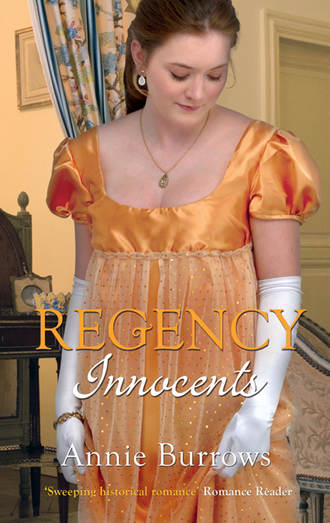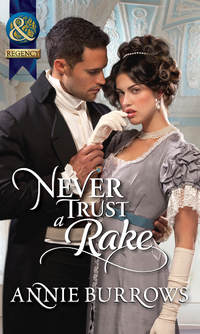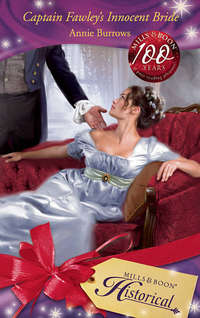
Полная версия
Regency Innocents: The Earl's Untouched Bride / Captain Fawley's Innocent Bride
‘I will go and order the removal of my own household,’ he said, rising from his chair and pulling his gloves on over his bruised knuckles. It would take some time to pack up the house and arrange transport for his staff. But he could leave all that in Giddings’ capable hands. He could most certainly leave immediately after the wedding ceremony. It only required his valet to pack an overnight case.
At first he assumed that once she had spoken her vows, and signed all the necessary documents, he would feel easier in his mind. But it was not so. Every time he glanced at the tense set of her pale face he wondered if she still considered the dairy farm at Dieppe a preferable option to being leg-shackled to a man of whom she was growing increasingly afraid. He was not being fanciful. She had admitted almost as soon as they had set out that she had left her one decent dress behind because it brought back bad memories.
It was the one she had been wearing the night he had forced that kiss on her.
Before long, he realised he was not going to be able to relax until he had her on board ship and out into the Channel. While they were in France there were innumerable ways for her to wriggle out of his grasp.
It was a great relief when, about ten miles out of Paris, her head began to droop. She couldn’t have slept a wink the night before to be sleeping so soundly in the jolting carriage. She must have been scared stiff of leaving her family and her country behind, and going to live amongst strangers. She made no demur when he tucked her wilting form against his shoulder, and once he was certain she was fully asleep he took the liberty of putting his arm round her, and settling her into a more comfortable position. She was so tiny, tucked against his heart. So frail a creature.
Surely there must be some way he could get her to see he was not a monster? Just a man who wanted to be her friend and protector. But how? When so far all he had done was bully and frighten her?
She did not wake until well into the afternoon.
‘Where are we?’ she yawned, pushing herself upright.
‘Abbeville. Since you were sleeping so soundly, I took the opportunity to press on. We have been able to cover far more ground than if we had needed to keep stopping to see to your comfort.’
His matter-of-fact tone brought her sharply to her senses. For a blissful moment, as she had come awake within the cradle of his powerful arms, she had mistaken the fact that he had allowed her to use his broad chest for her pillow as a mark of tenderness.
‘You will have your own suite of rooms tonight,’ he said, plunging her deeper into gloom. Of course he would not want any real intimacy with her. Their marriage was only for public show.
She was not very much surprised when a meal was brought to her own little parlour, or when she ate it alone. He had barely spoken a handful of words to her all day. On seeing the meagre amount of luggage she had packed, instead of appreciating her ability to travel light he had made a sarcastic comment about having to arrange credit at various smart outfitters once they arrived in London. After that Charles had turned from her and gazed fixedly out of the window.
The hotel was naturally first class, and the maid provided to help her prepare for bed was both efficient and friendly. But Heloise knew she would not sleep a wink, no matter how soft the feather mattress was. She had dozed in her husband’s arms nearly all day, and now she was wide awake—and as troubled as she had been the night before.
She had nobody but herself to blame for her predicament. She had approached Charles and offered to be the means by which he could salve his wounded pride. She should not feel offended that he cared so little for her that he would not even fight a duel when she was insulted in a public square. Besides, she had not wanted him to fight a duel. She could not bear to think of him being injured or, worse, killed on her account.
She would not be able to rest properly until he was safely in England, where Du Mauriac would not dare follow, she reflected, chewing at a fingernail.
Anyway, she had worked out, during the long sleepless hours of the previous night, that the quarrel in the Palais Royale had not been about her at all, no matter what words the men had used. Charles had clearly known far more about Du Mauriac than she had told him, else how would he have been able to sneer at his parentage? And another thing—it had only been when she had told him Du Mauriac was the suitor she wished to escape that he had shown any inclination to take her proposition seriously.
She shivered at the cold, calculating way Charles had behaved. He must have studied Du Mauriac closely to have taken the very course which would hurt him most. He had stolen his woman, refused to acknowledge him as a social equal, then knocked him down in a public place, rendering him an object of ridicule.
She drew the coverlet up to her chin, the cold seeping into her very soul. Felice had said he had no heart. He had warned her himself that his nature was so cold and vengeful he could sever the ties to his own family without a qualm.
No. She shook her head. Felice had been wrong. And when Charles himself had informed her of his nature there had been something in his eyes—almost as though he was taunting her with the description she had heard applied to him so often.
His treatment of Du Mauriac had been cold and vengeful, that was true. But Du Mauriac was a vile man who fully deserved all that Charles had done to him. And as for that business about cutting ties with the family who had raised him … well, yes, that did sound bad. But, knowing what she did of Charles, she would not be a bit surprised to learn that it was they who had done something dreadful, and that rather than expose them he’d let the gossip-mongers make what they would of it all.
She was startled out of her reverie when someone pushed her bedroom door open. This might be a first-class inn, but clearly some people lodging here had no manners. She was just opening her mouth to scream her objection at having her room invaded when she realised it was only Charles, entering not from the corridor but from a connecting door to another bedroom.
‘I am not a monster, Heloise,’ he sighed, stalking towards her. ‘You do not need to clutch the sheet up to your chin as though you fear I mean to ravish you. I can assure you, nothing is further from my mind.’
Relief that it was not some stranger about to assault her had her sagging into the pillows. Though his words rankled. Did he think she was a complete fool? She knew all too well that when he wanted a woman he would go to one of his mistresses.
‘I only came to inform you of the fact that I will not be making demands of that nature upon you. I said from the start that you are far too young to be married at all, leave alone face motherhood.’ He bent over her and placed a perfunctory kiss on her forehead. ‘Goodnight, Lady Walton,’ he said.
‘Goodnight, Charles,’ she replied, betraying by only the very slightest quiver in her lower lip her feeling of humiliated rejection.
She would not cry until he had left the room. He detested any display of emotion. She could only imagine how disgusted her complete breakdown the night before must have made him. But it probably accounted for his distant behaviour with her today. She must not make the mistake of showing such lack of breeding again. Even if he never came to care all that much for her, she would do her utmost to be the kind of wife he wanted—compliant and undemonstrative.
To prove that she could do this, she tried a shaky smile. To tell the truth, she did feel a measure of relief. She was totally unprepared for a wedding night with a husband who regarded her as a necessary evil. Or to endure the ordeal of being deflowered by a man who would regard it as a duty to be performed in the cold-blooded way he seemed to live the rest of his life.
Lord Walton ripped off his cravat the moment he entered his room, and flung it aside to land he knew not where. He felt as though he could not breathe. God, how scared of him she had looked! And how relieved when he had told her he had no intentions of claiming his husbandly rights! He strode to the side table and poured a measure of brandy into a tumbler. Then slumped into a chair, staring into its amber depths. He would find no solace there, he reflected, swirling the liquid round and round, warming it to release its fragrant fumes. The one time he had attempted to use alcohol as an anaesthetic it had failed him miserably. All it had done was make him feel sorry for himself. He had spouted the most maudlin nonsense to a virtual stranger, and woken with a thick head in the morning. He would need a clear head the next morning. If they could make an early enough start they would reach Calais and be sailing for home on the evening tide.
Providing Heloise did not fly from him during the night. Starting to his feet, he crossed to the chamber door. And paused with his hand on the latch.
Perhaps the gentlemanly thing to do would be to let her go.
Heloise deserved a man who could love and nurture her, not scare and bully her.
Dammit, why was it so impossible to behave rationally around her? He ran a hand over his brow.
Seeing her sitting in that bed, chewing her nails like a frightened, lonely child, had made him want to take her in his arms and comfort her. But he knew it would not have worked. He was the last person she would want to seek comfort from. He was the worst of her problems. Besides, the feel of her slight body, snuggled trustingly against his in the coach, had filled him with most unchivalrous longings. Right this moment he wanted her with a ferocity that made him disgusted with himself.
God, what had he done? What was he to do?
Determined to prove she was capable of behaving correctly, Heloise sat bolt upright in the carriage all the way to Calais. In spite of the fact she had spent most of the night crying into her pillow, she was not going to repeat the mistake of yielding to exhaustion and falling asleep on a husband who seemed to regard any form of touching as an intrusion on his personal dignity.
She had served her purpose—giving him the opportunity to take revenge on Du Mauriac and concealing the chink in his armour that was his love for Felice. And now he did not know quite what to do with her.
He was avoiding her as much as he could. When they got to Calais, he left her in the carriage while he arranged their passage, then installed her in a private parlour to await the sailing while he went off for a walk. On the few occasions when he had deigned to speak to her, he had done so with such icy civility she just knew he regretted giving in to the rash impulse to marry her.
And who could blame him? No one was more unsuitable to be the wife of such a man than she!
By the time he came to inform her it was time to embark, she was trembling so badly she had to cling to his arm for support.
Just as they reached the companionway, a messenger dashed up to them. ‘Countess of Walton? Formerly Mademoiselle Bergeron?’ he panted.
When she nodded, he reached into his pocket and pulled out a letter. ‘Thank heaven I reached you in time.’ He grinned. ‘Urgent, the sender said it was, that I got this to you before you left France.’ His mission complete, the man melted back into the crowd that thronged the quayside.
‘You had better open it at once,’ she heard Charles say, and he pulled her slightly to one side, so that they did not impede other passengers from boarding.
‘It is from my mother,’ she said, after swiftly scanning the few lines of hastily scrawled script. ‘Du Mauriac is dead.’
Translating for Charles, she read, “‘… the Royalist officials sent to arrest him employed such zeal that many Bonapartists rushed to his aid. In the ensuing brawl, somebody stabbed him. Nobody knows yet who it was …’”
She clutched the letter to her bosom, her eyes closing in relief. Charles was safe.
‘What violent times we live in,’ Charles remarked, wondering why it felt as though the dock had lurched beneath his feet.
Heloise had only married him to escape Du Mauriac’s clutches. What a pointless gesture she had made. If only she had waited a few days, and not panicked, she would not have had to make that ultimate sacrifice.
‘Dear me,’ he observed. ‘You need not have married me after all.’
Chapter Five

Oh, poor Charles! He was already smarting from taking on a wife he did not really want, and now he had learned that at least part of his reason for doing so had ceased to exist.
But, instead of betraying his annoyance, he held out his arm and said in an icily polite voice, ‘Will you come aboard now, madam?’
Oh, dear. She gulped. How he must wish he could just leave her on the quayside and go back to England alone. But he was too honourable even to suggest such a thing. Laying her hand upon his sleeve, she followed him up the gangplank, her heart so leaden in her chest she wondered it could keep beating.
He showed her to the cabin he had procured for the voyage, then informed her that he was going on deck. His face was frozen, his posture rigid, and she ached for his misery. It hurt all the more to know she was the cause of it!
Charles hardly dared breathe until the last rope was cast off and the ship began to slide out of the harbour. She had not made a last desperate bid for freedom. Even when the coast of France was no more than a smudge on the horizon, she remained resolutely belowdecks.
Avoiding him.
He paced restlessly, heedless of the spray which repeatedly scoured the decks.
His conscience was clear. After a night spent wrestling with it, he had deliberately given her several opportunities to give him the slip during the day. Why had she not taken them? She was not staying with him because she was avaricious, nor was she all that impressed by his title.
The only thing that might explain her resolute determination to stick to their bargain was the fact she had given her word. Did it mean so much to her? He pictured her eyes, burning with zeal when she had promised to be the best wife she knew how to be, and accepted that it must.
It was a novel concept, to link a woman with integrity. But then Heloise, he was beginning to see, was not like any woman he had ever known.
Below decks, Heloise groaned, wishing she could die. Then he would be sorry. She whimpered, reaching for the conveniently positioned bucket yet again. Or would he? No, he would probably just shrug one shoulder and declare that it was a great pity, but after all he could always marry someone else. It was not as though he cared for her—no, not one jot. How could he, to leave her to endure such suffering alone?
Not that she wanted him to see her in such a demeaning state, she amended, heaving into the bucket for what seemed like the hundredth time.
Oh, when would this nightmare be over? How long before she could leave this foul-smelling cupboard and breathe fresh air again?
Never, she realised, after an eternity had rolled and pitched relentlessly past. Though she could hear the sounds of the hull grating against the dock, of officers shouting commands and sailors running to obey, she was too weak to so much as lift her head from the coarse cotton pillow.
‘Come, now, my lady,’ she heard her husband’s voice say, none too patiently. ‘We have docked. It is high time to disembark—Good God!’
The evidence of Heloise’s violent seasickness finally caught his eyes.
‘Go away,’ she managed resentfully when he approached the bunk, stern purpose in his eyes. He was a brute to insist she get up and move. Later, once the ship had remained steady for several hours, she might regain the strength to crawl. ‘Leave me here to die,’ she moaned.
‘Nobody has ever yet died of seasickness,’ he said briskly, swinging her into his arms. It was amazing how cheerful he felt to discover it was seasickness which had kept her belowdecks, when he had been imagining her lying there weeping for her lost freedom. ‘I know it must have been unpleasant for you, but you will be right as a trivet once you get upon dry land.’
‘Unpleasant?’ she protested. ‘I have never suffered anything so horrid. How could you be so cruel as to force me to go to sea in a storm? I think—’ she hiccupped down a sob ‘—that I hate you.’
‘I am sure you don’t mean that,’ he reproved her mildly. Although he wasn’t at all convinced. ‘Besides, the sea was scarcely more than a bit choppy.’ He consoled himself with the reflection that, even if she did hate him, nothing but the direst distress would ever induce her to endure another sea voyage.
He had planned to push on to London straight away, but he could not force Heloise to travel in her weakened state. He told the coachman to stop at the first hotel that could offer a suite of rooms.
He left her to herself for as long as he could. But when night fell concern for her had him knocking on her door and marching in before she had time to deny him admittance.
She was sitting up in bed, looking much better. Indeed, the nearer he got to the bed, the rosier her cheeks grew …
He checked in the middle of the room, biting down on a feeling of irritation. Did she think he was crass enough to insist on his marital rights, after she had been so ill? But before he could begin to defend himself Heloise blurted out, ‘Oh, I am so sorry, Charles, about what I said.’
‘What exactly that you said are you apologising for?’ He frowned, drawing a chair to her bedside and settling himself on it.
‘For saying that I hate you! I thought you meant to force me to walk off that ship and try to behave like a lady, when all I wished to do was die. I never guessed you were going to pick me up and carry me. And I had spent the entire voyage cursing you, so it was hard to get myself out of thinking that everything was entirely your fault. Indeed, at that precise moment I think I did hate you. But of course now I have calmed down I fully accept it is not your fault that I have seasickness. And you weren’t at all cruel to force me to go on that ship. It would only have been cruel if you had known how ill I would be—and how could you, when I never knew myself? For I have never been on a ship before!’
‘Nor will you ever set foot on one again,’ he said with determination.
She shuddered. ‘Indeed not.’
He paused. ‘You know, of course, that means you can never return to France.’
They eyed each other warily as the import of his remark sank in, each convinced the other must regret this truth, and each equally determined to conceal their hurts.
It was Charles who ended the impasse, by leaning back, crossing one leg over the other, and declaring, ‘Since you do not hate me at this precise moment, perhaps this would be a good time to discuss our mode of life together?’
Recalling the way he had indicated he wished her to keep herself amused, and not interfere with his no doubt hectic social life, Heloise forced herself to nod, waiting to hear what further layers of humiliation he meant to heap on her.
‘I don’t wish to raise any speculation about my marriage by appearing to pack you off to the country as though I did not like you.’ She would have to live with him in London, just to begin with, to prevent any speculation regarding their union. Not that he cared what people said about him. But he did not want her exposed to the sort of malicious gossip that was bound to hurt her. ‘The season has not yet properly begun, but that will give you time to procure a suitable wardrobe and settle into your new role. I expect it will take you some time to find your feet, socially speaking, but until you have acquired your own circle of acquaintance I will ensure you always have a trustworthy escort to any event you may wish to attend.
‘Naturally, I do not expect you to understand the British political system. All I expect from you is to be charming to those I introduce as my political allies, and reserved towards my opponents. Even though you may not like them, I shall expect you to be hospitable to the more important party members to whom I shall make you known, and their wives, when I have occasion to invite them to any of my homes. Do not worry, however, that I shall expect much of you as a hostess. I have excellent staff running all my properties, and a sterling secretary to whom you may apply, should you find yourself floundering in the political shoals.’
Heloise listened to that patronising little speech with growing indignation. If it would not give rise to the very speculation he wished to avoid, he would as soon pack her off to one of his country houses. Her poor little brain was no match for the intricacies of the English political system. She was not to interfere in the management of any of his households, which were all running exactly as he wished. And if she had any questions, he wished her to apply to his secretary rather than bother him!
‘Heloise?’ he prompted, when she had been sitting in simmering silence for several minutes. He sighed. She clearly felt overwhelmed by the idea of being a leading figure in society. ‘You must tell me if there are any gaps in your education which may cause you difficulties.’ He had no intention of throwing her in at the deep end and letting her sink or swim as best she could.
‘G … gaps?’ she gasped, flashing him a look so indignant even he could not misinterpret it.
‘Don’t fly into the boughs with me,’ he retorted, annoyed that she should cling to her hostility when he was doing all in his power to smooth her entry into society. ‘If you cannot dance then I need to know, so that I may engage a dancing master for you. If you cannot ride then there is no point in me acquiring a horse for you to show off its paces in the park. I would instead purchase a barouche, or landaulet, and employ extra grooms to take you about.’
Her cheeks flushing, she hung her head. ‘I beg your pardon, my lord,’ she said, as humbly as she could. She had to admit he was trying to make the best of a bad job. He was prepared to employ as many staff as it would take to ensure she would be able to carry off the role he expected her to play. Just so long as he didn’t have to be personally involved.
‘I have learned to dance,’ she flashed at him. ‘Though you probably never saw me stand up whenever we went to balls in Paris. For not many men have ever asked me to dance, and when I was with you it was in the role of chaperon, so it was not at all appropriate. As for the horse, it is true that I cannot ride.’
‘Should you like to learn?’
‘Do you wish me to?’
‘I should never object to any activity which would give you pleasure, Heloise,’ he said wearily. It was clear that he was not going to win his wife’s trust overnight. And her mention of how he had neglected her, whilst showering attentions on her sister, reminded him she had a deep well of resentment from which to draw. ‘I bid you goodnight.’
He placed a chaste kiss on her forehead and retreated before things deteriorated any further. She might declare she did not hate him, but she had withdrawn sufficiently to start calling him ‘my lord’ again.
All he could do was keep sufficient distance for her to forget to regard him as a tyrant, whilst maintaining a watchful eye on her. She would learn, eventually, that she could trust him.
Wouldn’t she?
London was not at all like Paris. The streets and squares through which their carriage passed were so clean and orderly, giving an overall air of prosperity. She frowned. Although perhaps it was just that her husband inhabited one of the better areas. This, she surmised as the carriage drew to a halt outside an imposing mansion, whose doorway was flanked by two massive pillars supporting a portico, was probably the equivalent of the ‘court’ end of Paris. There were probably overcrowded and dirty alleys somewhere. It was just that as an English countess she would never set foot in them.








